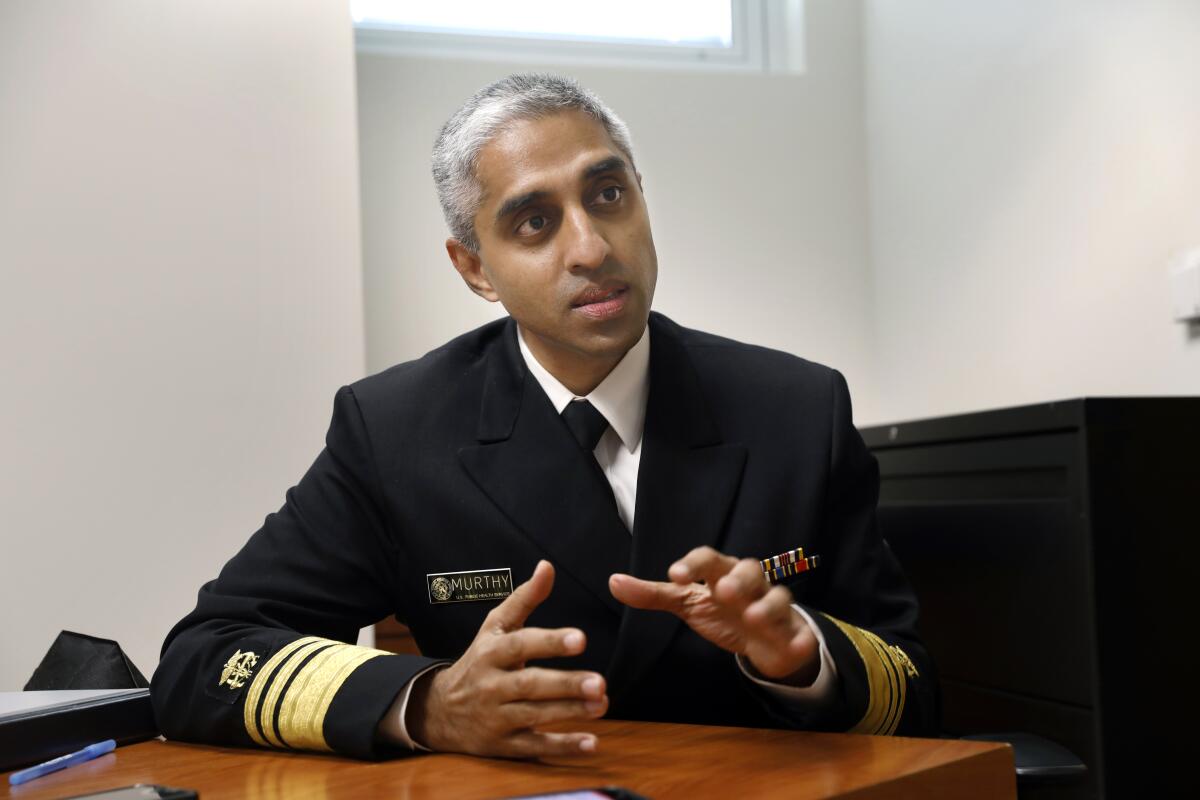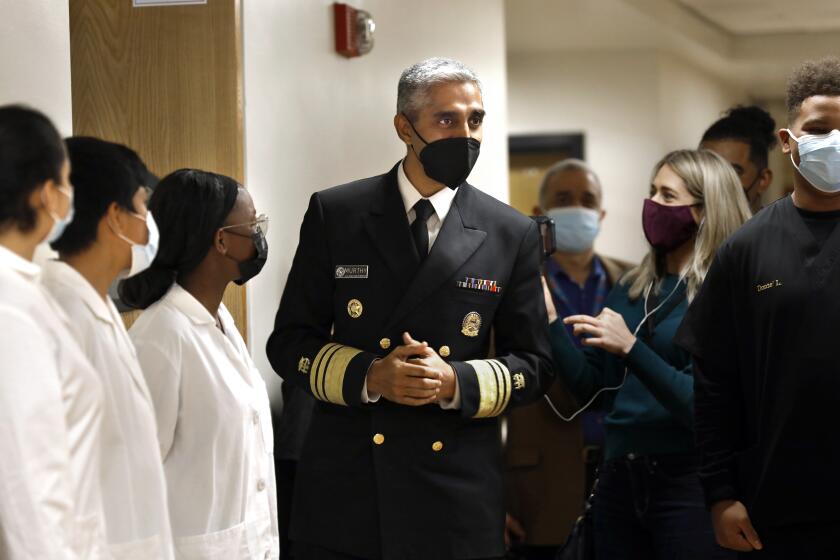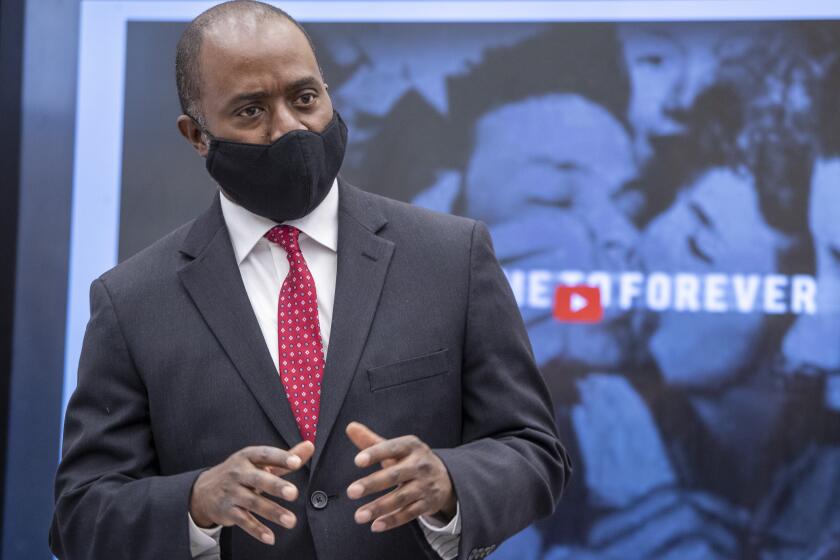‘The longer we wait, the more young people are suffering.’ Teen mental health needs help

- Share via
A major entertainment studio says it will feature plotlines about mental health in teen-targeted shows. Celebrity athletes say they will help destigmatize talk about mental health among young people. A Los Angeles nonprofit is expanding training for professional youth mentors.
Big technology and media companies, local groups, youth leaders, basketball players and educators are pledging to come together in response to the U.S. surgeon general’s public health advisory last December, warning of an “urgent” need to address a national youth crisis.
During a visit to Los Angeles on Tuesday for a conference, Surgeon Gen. Dr. Vivek Murthy unveiled a list of at least 30 entities with promising intentions.
“What led to the crisis of youth mental health was complex,” Murthy said, “and it was going to require many different sectors to pull together — from educational institutions to policymakers to foundations to technology companies and many more.
“It’s a first step, though, of many that we have to take,” he added, in order to address higher suicide rates, untreated mental disorders and anxiety and stress made worse by the COVID-19 pandemic.
Pivotal Ventures, an investment and incubation company created by Melinda French Gates “to advance social progress,” will work to expand access to mental health care for young people of color as well as to LGTBQ youth and their families.
Additionally, the Black Sheep Agency will design a “youth-centered branded campaign” to destigmatize conversations around mental health; the Miami Heat will deploy basketball players to the same end.
The advisory is to call attention to a “youth mental health crisis” and recommend resources to call on and actions to take.
“When I talk to young people and I ask them, ‘Why don’t you feel comfortable telling somebody that you’re feeling down?’ they say, ‘Well, you know, I just don’t want people to think that I’m broken in some way. I don’t want them to think something’s wrong with me, that I’m not somebody worth hanging out with anymore,’” Murthy said.
That stigma must be overcome, he added.
The Annie E. Casey Foundation will gather data on mental health to better inform policy, while the Healthy Gamer Foundation has pledged to develop products that promote positive online behavior.
TV network the CW has committed to addressing the issue in its shows, “which is going to be very powerful to help change the narrative around mental health for young people and demystify treatment and conversations about mental health,” Murthy said.
Locally, the California Endowment is committing $1 million in new funding to a “youth mental health campaign and coalition building,” and Friends of the Children-Los Angeles is expanding its training and clinical support for professional youth mentors.
Some of these contributions are new or in the works, while some represent ongoing efforts that Murthy wants to encourage to continue and expand.
Funding for the efforts can be difficult to quantify. In some instances, the contribution is an enhanced focus using existing resources, although the Vistria Group, an investment firm, has pledged $250 million to fund providers of youth mental health services.
In December, Murthy released the Surgeon General’s Advisory on Protecting Youth Mental Health, calling for “a swift and comprehensive response” from individuals, families, community organizations, foundations, media, government and technology companies.
California’s top public education official said the state will pursue an initiative to add 10,000 mental health clinicians to schools.
In some cases, he noted, solutions need to come from technology corporations that are arguably part of the problem.
The surgeon general praised Meta, parent company of Facebook and Instagram, for ongoing efforts, including rolling out “nudges” on Instagram that encourage teens to “take a break” from social media or move to other areas of potential interest. The surgeon-general’s release cited — without validating — assertions by Meta that these nudges “are grounded in expert guidance, as well as internal and external research suggesting that nudges can help shift online behavior.”
In one study, 65% of respondents said nudges had a positive effect on how teens use social media by making them more aware of how they spend their time on the platform.
Meta has come under fire for allegedly suppressing internal research indicating that Instagram use made “body image issues worse for one in three teen girls,” according to an internal presentation reviewed by the Wall Street Journal.
“We just haven’t seen enough transparency there,” Murthy said of Big Tech. Independent researchers “have been looking for years to understand and study the impact of technology and youth mental health. They tell us clearly and consistently that they do not have access to the data that they need from technology companies to fully understand the impact on youth mental health. ... The longer we wait, the more young people are suffering.”
Young people are experiencing an alarming increase in mental health challenges, the U.S. surgeon general has said. Here’s what you should know.
Big Tech companies are under fire from various fronts, including Congress, where antitrust legislation could break them up or at least change their way of doing business.
Google has pledged to publicize the upcoming 988 hotline, intended as a national, on-call lifeline to those suffering crises of mental health.
A surgeon general’s advisory is a public statement intended to focus national attention to an urgent health issue and provide recommendations for how it should be addressed. The surgeon general has limited direct power but traditionally speaks as the medical voice of expertise of the executive branch.
Murthy is on his second tour of duty after serving as surgeon general from 2014 to 2017, appointed by President Obama.
Under President Biden, his first health advisory flagged the “urgent threat” of medical misinformation, calling on tech and social media companies to operate more responsibly. Less than a month ago, he issued his latest advisory, warning of health worker burnout and the dangers it poses.
“All three advisories — health misinformation, youth mental health and health worker well-being — these all focus on issues that have been made worse by the pandemic, but they all predated the pandemic as well,” Murthy said.
More to Read
Sign up for Essential California
The most important California stories and recommendations in your inbox every morning.
You may occasionally receive promotional content from the Los Angeles Times.














